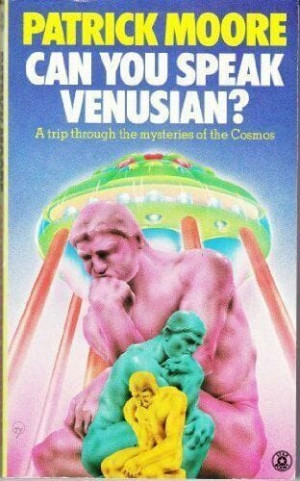The polite Venusian
Written on 12 Mar, 2023
As a teenager, I picked up ‘Can you speak Venusian?’ from the hotel library and enjoyed it so much I took it home with me. I figured hotel libraries are places people leave books they have finished reading, so I was okay to keep it. How did it get placed in the hotel? I’d like to think a future me time-travels back and puts it in the library; creating a closed-loop curio.
The book is Patrick Moore’s celebration of people who look at the world through a different ‘scientific’ lense (they aren’t all scientific but lets be polite and use that phrase). It’s a book that’s moved with me across several homes and still sits on the living room bookshelf.
The book started as a one-off BBC documentary and I’ve often wondered what the TV version was like. Thanks to YouTube I’ve now had chance to see it.
It’s slightly tongue-in-cheek, but Moore is at pains to give people the chance to express their views clearly. The levels of politeness are off the chart, even when out on a cold winter’s night with a man convinced clouds are UFOs. It’s a real throwback to a style of presenting that doesn’t exist anymore.
Today, Louis Theroux would act friendly but with a knowing wink to the audience, others would fill the airtime with their opinions rather than those of the of the guests, or loudly disagree.
As for the book? I leafed through it for the first time in years and, as with the TV show, the thinkers are given space to air their theories; although more space is given to those Moore respects more. John Bradbury gets a complete chapter detailing his unique view of the universe’s structure, others are grouped together based on themes like Atlantis, alien visitors, or universal billiards played with planets and comets.
It’s rare for an independent thinker to be right (Moore notes in his introduction that the great example of independent thinking overthrowing orthodoxy, Copernicus, got almost everything wrong) but reading Can You Speak Venusian? isn’t about deciding if you agree with the theories it contains. For me, it’s a fascinating insight into the minds of people who view science differently, and are unafraid to step away from the norm.
